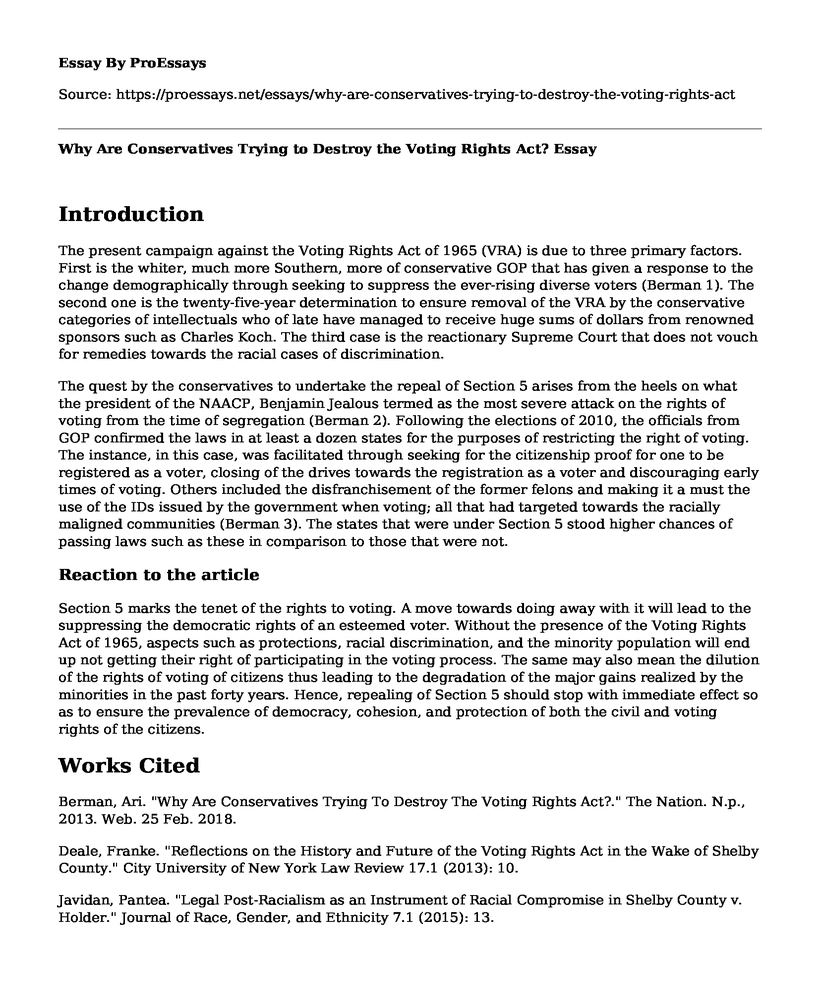Introduction
The present campaign against the Voting Rights Act of 1965 (VRA) is due to three primary factors. First is the whiter, much more Southern, more of conservative GOP that has given a response to the change demographically through seeking to suppress the ever-rising diverse voters (Berman 1). The second one is the twenty-five-year determination to ensure removal of the VRA by the conservative categories of intellectuals who of late have managed to receive huge sums of dollars from renowned sponsors such as Charles Koch. The third case is the reactionary Supreme Court that does not vouch for remedies towards the racial cases of discrimination.
The quest by the conservatives to undertake the repeal of Section 5 arises from the heels on what the president of the NAACP, Benjamin Jealous termed as the most severe attack on the rights of voting from the time of segregation (Berman 2). Following the elections of 2010, the officials from GOP confirmed the laws in at least a dozen states for the purposes of restricting the right of voting. The instance, in this case, was facilitated through seeking for the citizenship proof for one to be registered as a voter, closing of the drives towards the registration as a voter and discouraging early times of voting. Others included the disfranchisement of the former felons and making it a must the use of the IDs issued by the government when voting; all that had targeted towards the racially maligned communities (Berman 3). The states that were under Section 5 stood higher chances of passing laws such as these in comparison to those that were not.
Reaction to the article
Section 5 marks the tenet of the rights to voting. A move towards doing away with it will lead to the suppressing the democratic rights of an esteemed voter. Without the presence of the Voting Rights Act of 1965, aspects such as protections, racial discrimination, and the minority population will end up not getting their right of participating in the voting process. The same may also mean the dilution of the rights of voting of citizens thus leading to the degradation of the major gains realized by the minorities in the past forty years. Hence, repealing of Section 5 should stop with immediate effect so as to ensure the prevalence of democracy, cohesion, and protection of both the civil and voting rights of the citizens.
Works Cited
Berman, Ari. "Why Are Conservatives Trying To Destroy The Voting Rights Act?." The Nation. N.p., 2013. Web. 25 Feb. 2018.
Deale, Franke. "Reflections on the History and Future of the Voting Rights Act in the Wake of Shelby County." City University of New York Law Review 17.1 (2013): 10.
Javidan, Pantea. "Legal Post-Racialism as an Instrument of Racial Compromise in Shelby County v. Holder." Journal of Race, Gender, and Ethnicity 7.1 (2015): 13.
Jenkins, Scott H. "A Push for States Rights Laws to Create a New Articles of Confederation System of Government in America: Eliminating the Middle-Class by Enacting Right to Work Laws and Voter ID Laws." (2012).
Maier, Darin M. "NFHS Topic Proposal: Civil Rights."
Rhodes, Jesse H. Ballot Blocked: The Political Erosion of the Voting Rights Act. Stanford University Press, 2017.Unite, Rosemarie. "The Perrymander, Polarization, and Peyote v. Section 2 of the Voting Rights Act." Loy. LAL Rev. 46 (2012): 1075.
Cite this page
Why Are Conservatives Trying to Destroy the Voting Rights Act?. (2022, Mar 29). Retrieved from https://proessays.net/essays/why-are-conservatives-trying-to-destroy-the-voting-rights-act
If you are the original author of this essay and no longer wish to have it published on the ProEssays website, please click below to request its removal:
- Paper Example on Online Stalking
- Analysis Essay on the Three Strikes Law
- False Memories in Eyewitness Testimonies - Essay Sample
- Essay Example on Fighting Crime: Analysing US Federal Structure's 6 Models
- Essay Example on Powell v. CA: 8th Amendment & Supreme Court Ruling
- Essay on Crime Prevention Strategies: Enhancing Security with CPTED
- Unjust Prejudices at Work: A Violation of Human Rights - Research Paper







